- Home
- Emile Gaboriau
Le dossier no. 113. English
Le dossier no. 113. English Read online
Produced by Dagny; John Bickers
FILE NO. 113
By Emile Gaboriau
I
In the Paris evening papers of Tuesday, February 28, 1866, under thehead of _Local Items_, the following announcement appeared:
"A daring robbery, committed against one of our most eminent bankers,M. Andre Fauvel, caused great excitement this morning throughout theneighborhood of Rue de Provence.
"The thieves, who were as skilful as they were bold, succeeded inmaking an entrance to the bank, in forcing the lock of a safe that hasheretofore been considered impregnable, and in possessing themselvesof the enormous sum of three hundred and fifty thousand francs inbank-notes.
"The police, immediately informed of the robbery, displayed theiraccustomed zeal, and their efforts have been crowned with success.Already, it is said, P. B., a clerk in the bank, has been arrested,and there is every reason to hope that his accomplices will be speedilyovertaken by the hand of justice."
For four days this robbery was the town talk of Paris.
Then public attention was absorbed by later and equally interestingevents: an acrobat broke his leg at the circus; an actress made herdebut at a small theatre: and the _item_ of the 28th was soon forgotten.
But for once the newspapers were--perhaps intentionally--wrong, or atleast inaccurate in their information.
The sum of three hundred and fifty thousand francs certainly had beenstolen from M. Andre Fauvel's bank, but not in the manner described.
A clerk had also been arrested on suspicion, but no decisive proof hadbeen found against him. This robbery of unusual importance remained, ifnot inexplicable, at least unexplained.
The following are the facts as they were related with scrupulousexactness at the preliminary examination.
II
The banking-house of Andre Fauvel, No. 87 Rue de Provence, is animportant establishment, and, owing to its large force of clerks,presents very much the appearance of a government department.
On the ground-floor are the offices, with windows opening on the street,fortified by strong iron bars sufficiently large and close together todiscourage all burglarious attempts.
A large glass door opens into a spacious vestibule where three or fouroffice-boys are always in waiting.
On the right are the rooms to which the public is admitted, and fromwhich a narrow passage leads to the principal cash-room.
The offices of the corresponding clerk, book-keeper, and generalaccounts are on the left.
At the farther end is a small court on which open seven or eight littlewicket doors. These are kept closed, except on certain days when notesare due; and then they are indispensable.
M. Fauvel's private office is on the first floor over the offices, andleads into his elegant private apartments.
This private office communicates directly with the bank by means ofa narrow staircase, which opens into the room occupied by the headcashier.
This room, which in the bank goes by the name of the "cash-office," isproof against all attacks, no matter how skilfully planned; indeed, itcould almost withstand a regular siege, sheeted as it is like a monitor.
The doors, and the partition where the wicket door is cut, are coveredwith thick sheets of iron; and a heavy grating protects the fireplace.
Fastened in the wall by enormous iron clamps is a safe, a formidableand fantastic piece of furniture, calculated to fill with envy the poordevil who easily carries his fortune in a pocket-book.
This safe, which is considered the masterpiece of the firm of Becquet,is six feet in height and four and a half in width, made entirely ofwrought iron, with triple sides, and divided into isolated compartmentsin case of fire.
The safe is opened by an odd little key, which is, however, the leastimportant part of the mechanism. Five movable steel buttons, upon whichare engraved all the letters of the alphabet, constitute the real powerof this ingenious safe.
Before inserting the key into the lock, the letters on the buttons mustbe in the exact position in which they were placed when the safe waslocked.
In M. Fauvel's bank, as everywhere, the safe was always closed with aword that was changed from time to time.
This word was known only to the head of the bank and the cashier, eachof whom had also a key to the safe.
In a fortress like this, a person could deposit more diamonds than theDuke of Brunswick's, and sleep well assured of their safety.
But one danger seemed to threaten, that of forgetting the secret wordwhich was the "Open sesame" of the safe.
On the morning of the 28th of February, the bank-clerks were all busyat their various desks, about half-past nine o'clock, when a middle-agedman of dark complexion and military air, clad in deep mourning, appearedin the office adjoining the "safe," and announced to the five or sixemployees present his desire to see the cashier.
He was told that the cashier had not yet come, and his attention wascalled to a placard in the entry, which stated that the "cash-room" wasopened at ten o'clock.
This reply seemed to disconcert and annoy the newcomer.
"I expected," he said, in a tone of cool impertinence, "to find someonehere ready to attend to my business. I explained the matter to M. Fauvelyesterday. I am Count Louis de Clameran, an iron-manufacturer at Oloron,and have come to draw three hundred thousand francs deposited in thisbank by my late brother, whose heir I am. It is surprising that nodirection was given about it."
Neither the title of the noble manufacturer, nor his explanations,appeared to have the slightest effect upon the clerks.
"The cashier has not yet arrived," they repeated, "and we can do nothingfor you."
"Then conduct me to M. Fauvel."
There was a moment's hesitation; then a clerk named Cavaillon, who waswriting near a window, said:
"The chief is always out at this hour."
"Then I will call again," replied M. de Clameran.
And he walked out, as he had entered, without saying "Good-morning," oreven touching his hat.
"Not very polite, that customer," said little Cavaillon, "but he willsoon be settled, for here comes Prosper."
Prosper Bertomy, head cashier of Fauvel's banking-house, was a tall,handsome man, of about thirty, with fair hair and large dark-blue eyes,fastidiously neat, and dressed in the height of fashion.
He would have been very prepossessing but for a cold, reservedEnglish-like manner, and a certain air of self-sufficiency which spoiledhis naturally bright, open countenance.
"Ah, here you are!" cried Cavaillon, "someone has just been asking foryou."
"Who? An iron-manufacturer, was it not?"
"Exactly."
"Well, he will come back again. Knowing that I would get here late thismorning, I made all my arrangements yesterday."
Prosper had unlocked his office-door, and, as he finished speaking,entered, and closed it behind him.
"Good!" exclaimed one of the clerks, "there is a man who never letsanything disturb him. The chief has quarrelled with him twenty times foralways coming too late, and his remonstrances have no more effect uponhim than a breath of wind."
"And very right, too; he knows he can get anything he wants out of thechief."
"Besides, how could he come any sooner? a man who sits up all night, andleads a fast life, doesn't feel like going to work early in the morning.Did you notice how very pale he looked when he came in?"
"He must have been playing heavily again. Couturier says he lost fifteenthousand francs at a sitting last week."
"His work is none the worse done for all that," interrupted Cavaillon."If you were in his place--"
He stopped short. The cash-room door suddenly opened, and the cashierappeared before them with tot
tering step, and a wild, haggard look onhis ashy face.
"Robbed!" he gasped out: "I have been robbed!"
Prosper's horrified expression, his hollow voice and trembling limbs,betrayed such fearful suffering that the clerks jumped up from theirdesks, and ran toward him. He almost dropped into their arms; he wassick and faint, and fell into a chair.
His companions surrounded him, and begged him to explain himself.
"Robbed?" they said; "where, how, by whom?"
Gradually, Prosper recovered himself.
"All the money I had in the safe," he said, "has been stolen."
"All?"
"Yes, all; three packages, each containing one hundred notes of athousand francs, and one package of fifty thousand. The four packageswere wrapped in a sheet of paper, and tied together."
With the rapidity of lightning, the news of the robbery spreadthroughout the banking-house, and the room was soon filled with curiouslisteners.
"Tell us, Prosper," said young Cavaillon, "did you find the safe brokenopen?"
"No; it is just as I left it."
"Well then, how, why----"
"Yesterday I put three hundred and fifty thousand francs in the safe;and this morning they are gone."
All were silent except one old clerk, who did not seem to share thegeneral consternation.
"Don't distress yourself, M. Bertomy," he said: "perhaps the chiefdisposed of the money."
The unhappy cashier started up with a look of relief; he eagerly caughtat the idea.
"Yes!" he exclaimed, "you are right: the chief must have taken it."
But, after thinking a few minutes, he said in a tone of deepdiscouragement:
"No, that is impossible. During the five years that I have had charge ofthe safe, M. Fauvel has never opened it except in my presence. Severaltimes he has needed money, and has either waited until I came, or sentfor me, rather than touch it in my absence."
"Well," said Cavaillon, "before despairing, let us ascertain."
But a messenger had already informed M. Fauvel of the disaster.
As Cavaillon was about to go in quest of him, he entered the room.
M. Andre Fauvel appeared to be a man of fifty, inclined to corpulency,of medium height, with iron-gray hair; and, like all hard workers, hehad a slight stoop.
Never did he by a single action belie the kindly expression of his face.
He had a frank air, a lively, intelligent eye, and large, red lips.
Born in the neighborhood of Aix, he betrayed, when animated, a slightProvencal accent that gave a peculiar flavor to his genial humor.
The news of the robbery had extremely agitated him, for his usuallyflorid face was now quite pale.
"What is this I hear? what has happened?" he said to the clerks, whorespectfully stood aside when he entered the room.
The sound of M. Fauvel's voice inspired the cashier with the factitiousenergy of a great crisis. The dreaded and decisive moment had come; hearose, and advanced toward his chief.
"Monsieur," he began, "having, as you know, a payment to make thismorning, I yesterday drew from the Bank of France three hundred andfifty thousand francs."
"Why yesterday, monsieur?" interrupted the banker. "I think I have ahundred times ordered you to wait until the day of the payment."
"I know it, monsieur, and I did wrong to disobey you. But the evil isdone. Yesterday evening I locked the money up: it has disappeared, andyet the safe has not been broken open."
"You must be mad!" exclaimed M. Fauvel: "you are dreaming!"
These few words destroyed all hope; but the very horror of the situationgave Prosper, not the coolness of a matured resolution, but that sortof stupid, stolid indifference which often results from unexpectedcatastrophes.
It was with apparent calmness that he replied:
"I am not mad; neither, unfortunately, am I dreaming: I am simplytelling the truth."
This tranquillity at such a moment appeared to exasperate M. Fauvel. Heseized Prosper by the arm, and shook him roughly.
"Speak!" he cried out. "Speak! who do you pretend to say opened thesafe? Answer me!"
"I cannot say."
"No one but you and I knew the secret word. No one but you and myselfhad keys."
This was a formal accusation; at least, all the auditors present sounderstood it.
Yet Prosper's strange calmness never left him for an instant. He quietlyreleased himself from M. Fauvel's grasp, and very slowly said:
"In other words, monsieur, I am the only person who could have takenthis money."
"Unhappy wretch!"
Prosper drew himself to his full height, and, looking M. Fauvel full inthe face, added:
"Or you!"
The banker made a threatening gesture; and there is no knowing whatwould have happened if they had not been interrupted by loud and angryvoices at the entry-door.
A man insisted upon entering in spite of the protestations of theerrand-boys, and succeeded in forcing his way in. It was M. de Clameran.
The clerks stood looking on, bewildered and motionless. The silence wasprofound, solemn.
It was easy to see that some terrible question, a question of life ordeath, was being weighed by all these men.
The iron-founder did not appear to observe anything unusual. Headvanced, and without lifting his hat said, in the same impertinenttone:
"It is after ten o'clock, gentlemen."
No one answered; and M. de Clameran was about to continue, when, turningaround, he for the first time saw the banker, and walking up to himsaid:
"Well, monsieur, I congratulate myself upon finding you in at last. Ihave been here once before this morning, and found the cash-room notopened, the cashier not arrived, and you absent."
"You are mistaken, monsieur, I was in my office."
"At any rate, I was told you were out; that gentleman over there assuredme of the fact."
And the iron-founder pointed out Cavaillon.
"However, that is of little importance," he went on to say. "I return,and this time not only the cash-room is closed, but I am refusedadmittance to the banking-house, and find myself compelled to force myway in. Be so good as to tell me whether I can have my money."
M. Fauvel's flushed face turned pale with anger as he listened to thisinsolence; yet he controlled himself.
"I would be obliged to you monsieur, for a short delay."
"I thought you told me--"
"Yes, yesterday. But this morning, this very instant, I find I have beenrobbed of three hundred and fifty thousand francs."
M. de Clameran bowed ironically, and said:
"Shall I have to wait long?"
"Long enough for me to send to the bank."
Then turning his back on the iron-founder, M. Fauvel said to hiscashier:
"Write and send as quickly as possible to the bank an order for threehundred thousand francs. Let the messenger take a carriage."
Prosper remained motionless.
"Do you hear me?" said the banker angrily.
The cashier trembled; he seemed as if trying to shake off a terriblenightmare.
"It is useless to send," he said in a measured tone; "we owe thisgentleman three hundred thousand francs, and we have less than onehundred thousand in the bank."
M. de Clameran evidently expected this answer, for he muttered:
"Naturally."
Although he pronounced this word, his voice, his manner, his faceclearly said:
"This comedy is well acted; but nevertheless it is a comedy, and I don'tintend to be duped by it."
Alas! After Prosper's answer, and the iron-founder's coarsely expressedopinion, the clerks knew not what to think.
The fact was, that Paris had just been startled by several financialcrashes. The thirst for speculation caused the oldest and most reliablehouses to totter. Men of the most unimpeachable honor had to sacrificetheir pride, and go from door to door imploring aid.
Credit, that rare bird of security and peace, rested with non
e, butstood with upraised wings, ready to fly off at the first rumor ofsuspicion.
Therefore this idea of a comedy arranged beforehand between the bankerand his cashier might readily occur to the minds of people who, if notsuspicious, were at least aware of all the expedients resorted toby speculators in order to gain time, which with them often meantsalvation.
M. Fauvel had had too much experience not to instantly divine theimpression produced by Prosper's answer; he read the most mortifyingdoubt on the faces around him.
"Oh! don't be alarmed, monsieur," said he to M. de Clameran, "this househas other resources. Be kind enough to await my return."
He left the room, went up the narrow steps leading to his study, andin a few minutes returned, holding in his hand a letter and a bundle ofsecurities.
"Here, quick, Couturier!" he said to one of his clerks, "take mycarriage, which is waiting at the door, and go with monsieur to M. deRothschild's. Hand him this letter and these securities; in exchange,you will receive three hundred thousand francs, which you will hand tothis gentleman."
The iron-founder was visibly disappointed; he seemed desirous ofapologizing for his impertinence.
"I assure you, monsieur, that I had no intention of giving offence. Ourrelations, for some years, have been such that I hope--"
"Enough, monsieur," interrupted the banker, "I desire no apologies. Inbusiness, friendship counts for nothing. I owe you money: I am not readyto pay: you are pressing: you have a perfect right to demand what isyour own. Follow my clerk: he will pay you your money."
Then he turned to his clerks who stood curiously gazing on, and said:
"As for you, gentlemen, be kind enough to resume your desks."
In an instant the room was cleared of everyone except the clerks whobelonged there; and they sat at their desks with their noses almosttouching the paper before them, as if too absorbed in their work tothink of anything else.
Still excited by the events so rapidly succeeding each other, M.Andre Fauvel walked up and down the room with quick, nervous steps,occasionally uttering some low exclamation.
Prosper remained leaning against the door, with pale face and fixedeyes, looking as if he had lost the faculty of thinking.
Finally the banker, after a long silence, stopped short before Prosper;he had determined upon the line of conduct he would pursue.
"We must have an explanation," he said. "Let us go into your office."
The cashier mechanically obeyed without a word; and his chief followedhim, taking the precaution to close the door after him.
The cash-room bore no evidences of a successful burglary. Everything wasin perfect order; not even a paper was misplaced.
The safe was open, and on the top shelf lay several rouleaus of gold,overlooked or disdained by the thieves.
M. Fauvel, without troubling himself to examine anything, took a seat,and ordered his cashier to do the same. He had entirely recovered hisequanimity, and his countenance wore its usual kind expression.
"Now that we are alone, Prosper," he said, "have you nothing to tellme?"
The cashier started, as if surprised at the question. "Nothing,monsieur, that I have not already told you."
"What, nothing? Do you persist in asserting a fable so absurd andridiculous that no one can possibly believe it? It is folly! Confide inme: it is your only chance of salvation. I am your employer, it is true;but I am before and above all your friend, your best and truest friend.I cannot forget that in this very room, fifteen years ago, you wereintrusted to me by your father; and ever since that day have I had causeto congratulate myself on possessing so faithful and efficient aclerk. Yes, it is fifteen years since you came to me. I was then justcommencing the foundation of my fortune. You have seen it graduallygrow, step by step, from almost nothing to its present height. As mywealth increased, I endeavored to better your condition; you, who,although so young, are the oldest of my clerks. At each inventory of myfortune, I increased your salary."
Never had Prosper heard him express himself in so feeling and paternal amanner. Prosper was silent with astonishment.
"Answer," pursued M. Fauvel: "have I not always been like a father toyou? From the first day, my house has been open to you; you were treatedas a member of my family; Madeleine and my sons looked upon you as abrother. But you grew weary of this peaceful life. One day, a year ago,you suddenly began to shun us; and since then----"
The memories of the past thus evoked by the banker seemed too much forthe unhappy cashier; he buried his face in his hands, and wept bitterly.
"A man can confide everything to his father without fear of beingharshly judged," resumed M. Fauvel. "A father not only pardons, heforgets. Do I not know the terrible temptations that beset a young manin a city like Paris? There are some inordinate desires before which thefirmest principles must give way, and which so pervert our moral senseas to render us incapable of judging between right and wrong. Speak,Prosper, Speak!"
"What do you wish me to say?"
"The truth. When an honorable man yields, in an hour of weakness, totemptation, his first step toward atonement is confession. Say to me,Yes, I have been tempted, dazzled: the sight of these piles of goldturned my brain. I am young: I have passions."
"I?" murmured Prosper. "I?"
"Poor boy," said the banker, sadly; "do you think I am ignorant of thelife you have been leading since you left my roof a year ago? Can younot understand that all your fellow-clerks are jealous of you? that theydo not forgive you for earning twelve thousand francs a year? Never haveyou committed a piece of folly without my being immediately informed ofit by an anonymous letter. I could tell the exact number of nightsyou have spent at the gaming-table, and the amount of money you havesquandered. Oh, envy has good eyes and a quick ear! I have greatcontempt for these cowardly denunciations, but was forced not only toheed them, but to make inquiries myself. It is only right that I shouldknow what sort of a life is led by the man to whom I intrust my fortuneand my honor."
Prosper seemed about to protest against this last speech.
"Yes, my honor," insisted M. Fauvel, in a voice that a sense ofhumiliation rendered still more vibrating: "yes, my credit might havebeen compromised to-day by this M. de Clameran. Do you know how muchI shall lose by paying him this money? And suppose I had not had thesecurities which I have sacrificed? you did not know I possessed them."
The banker paused, as if hoping for a confession, which, however, didnot come.
"Come, Prosper, have courage, be frank. I will go upstairs. You willlook again in the safe: I am sure that in your agitation you did notsearch thoroughly. This evening I will return; and I am confident that,during the day, you will have found, if not the three hundred and fiftythousand francs, at least the greater portion of it; and to-morrowneither you nor I will remember anything about this false alarm."
M. Fauvel had risen, and was about to leave the room, when Prosperarose, and seized him by the arm.
"Your generosity is useless, monsieur," he said, bitterly; "havingtaken nothing, I can restore nothing. I have searched carefully; thebank-notes have been stolen."
"But by whom, poor fool? By whom?"
"By all that is sacred, I swear that it was not by me."
The banker's face turned crimson. "Miserable wretch!" cried he, "do youmean to say that I took the money?"
Prosper bowed his head, and did not answer.
"Ah! it is thus, then," said M. Fauvel, unable to contain himself anylonger. "And you dare--. Then, between you and me, M. Prosper Bertomy,justice shall decide. God is my witness that I have done all I could tosave you. You will have yourself to thank for what follows. I have sentfor the commissary of police: he must be waiting in my study. Shall Icall him down?"
Prosper, with the fearful resignation of a man who abandons himself,replied, in a stifled voice:
"Do as you will."
The banker was near the door, which he opened, and, after giving thecashier a last searching look, said to an office-boy:
&nbs
p; "Anselme, ask the commissary of police to step down."

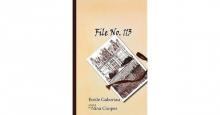 Le dossier no. 113. English
Le dossier no. 113. English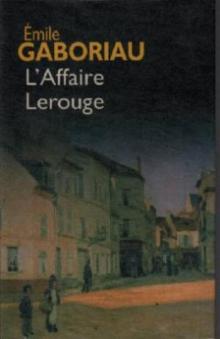 L'affaire Lerouge. English
L'affaire Lerouge. English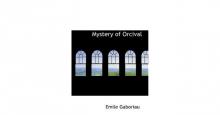 Le crime d'Orcival. English
Le crime d'Orcival. English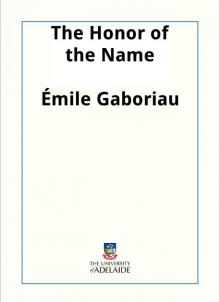 The Honor of the Name
The Honor of the Name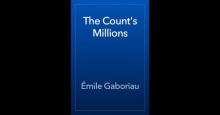 The Count's Millions
The Count's Millions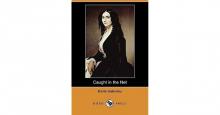 Caught in the Net
Caught in the Net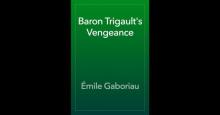 Baron Trigault's Vengeance
Baron Trigault's Vengeance La clique dorée. English
La clique dorée. English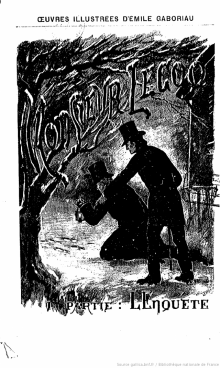 Monsieur Lecoq, v. 1
Monsieur Lecoq, v. 1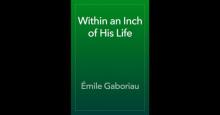 Within an Inch of His Life
Within an Inch of His Life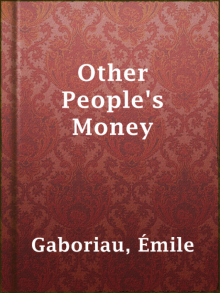 Other People's Money
Other People's Money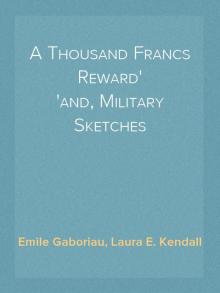 A Thousand Francs Reward; and, Military Sketches
A Thousand Francs Reward; and, Military Sketches